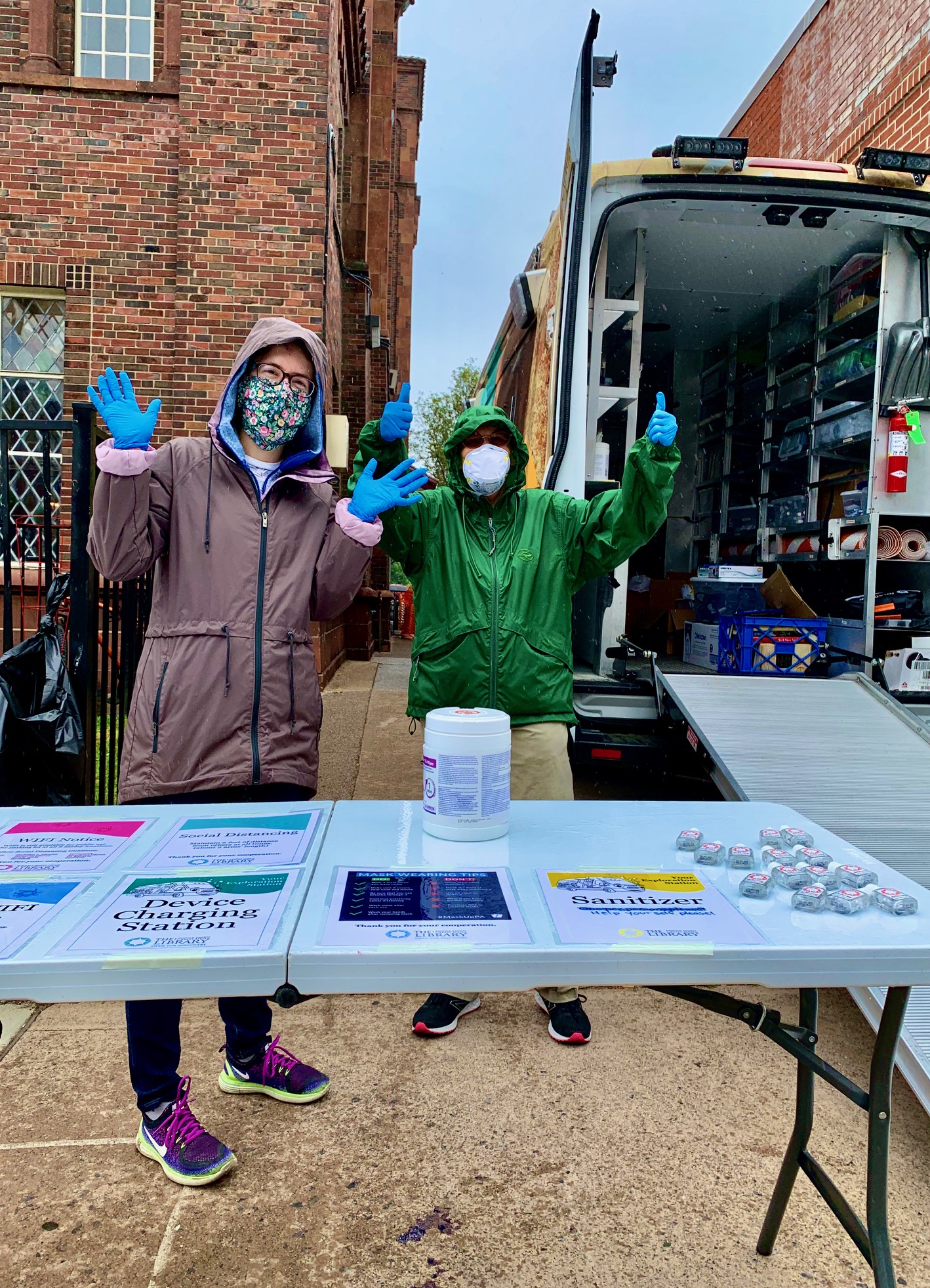For community members experiencing homelessness, a donated cellphone can be a lifeline to health care and social services. In the COVID-19 crisis, phones helped some of them apply for stimulus checks.
But the phones are just plastic and components without a place to charge them and a reliable Wi-Fi hotspot. As Pennsylvania’s COVID-19 shutdown further isolated already vulnerable populations, The Library powered up its MARCO van. The popular mobile exploration station joined a county-wide effort by governmental agencies, nonprofits, and faith organizations to bring essential services to many of the area’s economically disadvantaged.
MARCO made its debut in 2017 and has visited shelters, elder care facilities, child care centers, parks, and community events. Equipped with Wi-Fi hotspot, charging stations, smart television and digital media player, laptops, and a bubble machine loved by children of all ages, MARCO delivers vital library services to every corner of Dauphin County.
During the pandemic, The Library partnered with the Capital Area Coalition on Homelessness (CACH) and MARCO also provided toiletries, sanitizing supplies, and books to Harrisburg’s citizens experiencing homeless and other challenges.
“People could travel to our libraries and use the Wi-Fi in the parking lots, but some of our community members, including those who are disadvantaged or experiencing homelessness, didn’t have access to those services,” says Adult Programming and Outreach Coordinator Ashley Famularo.
When The Library closed its buildings from April through June, the system continued offering online access to eBooks and services, while Wi-Fi continued to beam from the premises.
 With doors to public spaces closed, the world for people who are experiencing homeless or other challenges “shuttered and shrank drastically,” reported CACH. Access to meals and public restrooms suddenly halted. Street outreaches providing health care, substance abuse counseling, and mental health services switched to telecommunication. Still, two-thirds of unsheltered people did not have operating phones or access to computers or the internet.
With doors to public spaces closed, the world for people who are experiencing homeless or other challenges “shuttered and shrank drastically,” reported CACH. Access to meals and public restrooms suddenly halted. Street outreaches providing health care, substance abuse counseling, and mental health services switched to telecommunication. Still, two-thirds of unsheltered people did not have operating phones or access to computers or the internet.
“That was a big need,” Famularo says.
Before the coronavirus shutdown, the Library had previously developed partnerships to take MARCO to homeless encampments. Those connections led to the invitation to join outreach sessions in downtown Harrisburg, and MARCO went back to work on May 7.
Every Thursday, MARCO joins other service providers in a CACH “one-stop-shop” at Penn Street and the Mulberry Street Bridge. There, those experiencing homeless and other challenges can find help with housing, food, clothing, mental health, health care, and services targeting veterans and youth.
On Monday, Wednesday, and Friday, MARCO visits the East Shore YMCA, where community members experiencing the challenge of homelessness can access the Y’s showers, get medical screenings, and other assistance.
For the effort, Library staff established safety and hygiene protocols. They also equipped MARCO with information on social distancing and the proper way to wear face masks.
An average of 17 people visit the van each day. Two Library personnel staff each two- or three-hour session. They bring a laptop so members can check email, sign up for unemployment relief, get their federal stimulus checks, or file taxes. Or, members plug in their own laptop and, sitting at a table offered by Library staff, access the internet via MARCO’s Wi-Fi.
Because The Library was not loaning physical books during the shutdown, MARCO provided books people could keep.
“We have a lot of mystery lovers,” says Famularo. “Mystery and thrillers are definitely the most popular. A lot of James Patterson. A lot of Dan Brown.”
The people served “have been appreciative of the basic resources we have, and of the reference questions we can answer,” she adds. “Even seeing a familiar face at a set time and place every week is appreciated. Quite a few people come over just to have a conversation.”
The effort forges ties that will advise The Library’s future efforts to strengthen services for the county’s community members who are experiencing homelessness and the underserved.
“As we build these relationships and gain some trust with these community members, we’re able to ask what their needs are and how we might move forward in creating sustainable change and positive solutions that aren’t short-term,” says Famularo. “As the county goes into the green phase, we’re not going to disappear.”



